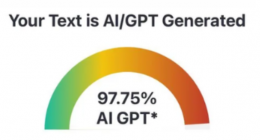A system error of Microsoft Word caused widespread disabling of the italics function earlier this week, forcing faculty and graduate students across the country to remove italicized foreign-language words from papers and articles, making their prose easier to read and less pretentious.
“This is a problem of cyclopean proportions,” said an anonymous source at Dædalus, the journal of the American Academy of Arts and Sciences.
“Virtually all fields of academia rely on an excessively ponderous, arid, and pretentious style, which is thoroughly undermined by the absence of italics.
”
Italics are used in the writing of non-English words, which are often substituted in academic writing for common but less impressive words of equivalent meaning.
“My paper now reads like a really good middle school book report,” said Joel van Hutten, a Yale graduate student in American history.
“The ideas are not all different from the original version, but the fact that a popular audience can now understand it makes it completely unpublishable.”
As Word systems failed, Academic departments across the country scrambled to issue extensions for grad student papers, and professors themselves worked to revise articles slated to appear in academic journals. Two Amherst English professors are currently in critical condition after jumping from their third-story offices.
According to van Hutten, even sociology faculty members were furiously editing late into the night. “We have to rebuild the ivory tower to its previous heights of aloofness, but we lack the tools. We’re missing a certain…je ne sais quoi.”
“My paper on the provincial tariff collection system of the Yuan Dynasty in thirteenth century China was supposed to go to press this week,” said J. Lyman Spencer, professor of Chinese history at the University of Illinois.
His article was pulled from the most recent edition of Chinese Historical Review because of formatting problems connected to the malfunction. “I just don’t know how relevant this article will be when the next issue comes out in a few months.”
“My authoritative voice is shattered,” said Adele Marks, an assistant professor of Comparative Literature at the University of Chicago, after being forced to replace “sine qua non” with “essential component.” she said, “I don’t even want to think about what this does to my prospects for tenure.”
“It’s a real tragedy,” added Spencer. “The academy has spent centuries building a vernacular that insulates us from the outside world and makes us appear smarter than we are.
It’s scary to think that one computer error could undo all that progress in an instant.
”




